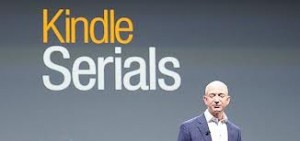My eighth Jackson novel is completed, except for the Thomas & Mercer editing process. When I submitted it in early December, I expected it to be released in the fall of this year (2013). But the T&M schedule is full, and Jackson #8 isn’t slotted until next February (2014)—a full year after Jackson #7 releases next month.
Waiting makes me (and most of  my readers) crazy, so this schedule isn’t good for me. My editor offered me an alternative: release the book as as a Kindle Serial this spring and summer, which means it will be on the market, in full, by this fall.
my readers) crazy, so this schedule isn’t good for me. My editor offered me an alternative: release the book as as a Kindle Serial this spring and summer, which means it will be on the market, in full, by this fall.
But the serial aspect makes me nervous. Even though serial books are clearly labeled—so readers should realize they’re only getting chunks of the story at a time—the books often get bad reviews. Many readers hate waiting for the next “episode” and give the novels one-star ratings. They also use much of their review space to criticize the format.
My editor thinks it’s an opportunity to take advantage of advertising avenues that aren’t offered to traditional books. He thinks it could expand my readership. I like both of those ideas. And I love my editor. He’s been right about many things. But I’m worried about my current readership. They like to read my books in a couple of big gulps. And I like them to rave about “not being able to put it down.”
Of course, readers don’t have to buy it as a serial. They can wait until all the episodes are released and buy the whole book in the fall. But that means waiting three months to buy the book, knowing that some, or most, of it is already available. If you buy it as a serial, it’s only $1.99. I think you pay full price ($4.99) if you wait.
But my biggest concern is that many readers will not understand the serial process. Because I’ve never released a Jackson book that way, they might just see the new story and buy it—without reading all the disclaimers. Lovely, loyal people that they are. But two or three chapters in, the book will stop, and they’ll have to wait a week or so for more.
I don’t like to read that way, and I suspect my Jackson fans don’t either. So I’m leaning toward saying no. What do you think, readers? Does the serial idea appeal to you, especially if you’ll get the story sooner? Or would you rather wait and get the book all at once early next year?

